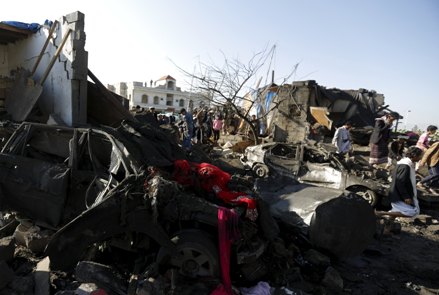Brent crude oil soared more than 4 percent towards US$59 a barrel on Thursday after Saudi Arabia and its Gulf Arab allies began a military operation in Yemen, which sits on a key shipping passage between Europe and the Arab Gulf.
The air strikes against Houthi rebels, who have driven the president from Yemen's capital Sanaa, could stoke concerns about the security of Middle East oil shipments if the conflict widens.
Brent futures were up $2.47 at $58.93 by 1158 GMT. U.S. crude was up $2.16 at $51.37 a barrel. Brent and U.S. crude prices spiked around 6 percent earlier in the session but pared gains in European trading.
"Geopolitical risk like this has been on the back burner for a while because we've been focussing on global oversupply," said Ole Hansen, head of commodity strategy at Saxo Bank.
"This news has not made the oversupply go away. The upside potential is limited unless something escalates. We need to see how this unfolds over the next couple of days," he said.
Iranian officials demanded an immediate halt to Saudi-led military operations in Yemen and said Tehran would make all necessary efforts to control the crisis there, Iranian news agencies reported.
In order to export to Europe, Arab producers have to ship oil past Yemen's coastlines via the Gulf of Aden to get to the Suez Canal.
Four Egyptian naval vessels have passed through the Suez Canal en route to Yemen to secure the Gulf of Aden, maritime sources said.
The waters between Yemen and Djibouti, known as Bab el-Mandeb, are less than 40 km (25 miles) wide. They are considered a "chokepoint" to global oil supplies by the U.S. Energy Information Administration (EIA).
The EIA estimates that 3.8 million barrels a day of crude oil passed through Bab el-Mandeb in 2013, the latest year for which figures were available.
The region is heavily populated with Western military forces. The United States and France operate large military bases in Djibouti. NATO's anti-piracy fleet also operates from the Gulf of Aden.
While the strikes have not yet disrupted major oil facilities of key Gulf producers, such as Saudi Arabia, there are concerns that the conflict might widen. The Shi'ite Houthis have received some support from Iran, Saudi Arabia's long-time rival for dominance in the Middle East.
State-run Kuwait Petroleum Corp said the OPEC member country had raised security around its oil facilities after the military operation in Yemen.
Yemen shut its major seaports on Thursday, industry and local sources said.






















































